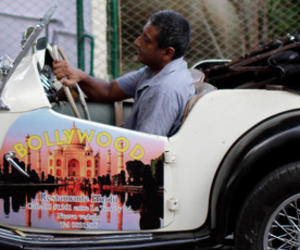Cuba's free market reform spawns advertising boom
- Submitted by: lena campos
- Business and Economy
- 06 / 19 / 2012

La Pachanga burger restaurant is one of the most successful at innovative advertising.
For decades there's been no such thing as a commercial radio or TV spot in Cuba. Ditto for billboards, website banner ads and newspaper classifieds.
It can be a refreshing change from the global marketing onslaught, but the lack of traditional advertising opportunities creates a problem for the thousands of budding entrepreneurs who have embraced President Raul Castro's push for limited free-market reform.
It's one thing to open your own business, but how to let potential customers know you exist? True to Cuba's famous knack for making do, the island's small-business owners have turned to low-cost, unconventional advertising, a flurry of guerrilla marketing in a Marxist society whose founder, Fidel Castro, once denounced advertising as "alienating and noxious".
Getting the word out is a nightmare, said Cedric Fernando, operator of Bollywood, Cuba's only Indian restaurant, which opened in December. "We're running a race with one leg."
Fernando, a Londoner of Sri Lankan descent who is married to a Cuban, emblazoned both doors of his 1955 MG roadster convertible with the Bollywood logo, converting it into a rolling conversation-starter. Some people have snapped pictures with cellphones, called and made reservations.
He also recently paid someone US$10 a day to slap coupons for two free drinks on to windshields around Havana, taking advantage of Cuba's colour-coded licence plate system to target a select clientele.
A thousand flyers lured about 50 dining parties to Bollywood in just two weeks.
"We put one on the ambassador of Spain's car a few days back and he turned up."
Customers of the Enigma beauty salon go home with pens and lighters emblazoned with its logo and phone number.
At La Pachanga, a bustling burger joint, owner Sergio Alba Marin has pioneered the art of bumper-sticker marketing in Cuba, persuading more than 1500 motorists to plaster his bright yellow decals on their cars for a 25 per cent discount.
Probably nobody in Cuba has been more successful than Alba at drawing eyeballs to his brand. Besides the stickers, customers take home tiny, branded straw hats.
He scored something of a marketing coup last month when more than 30 employees, customers and friends wearing La Pachanga T-shirts marched in Havana's May Day parade carrying a banner supporting the Cuban Revolution.
The state-run media gave it prominent coverage. La Pachanga's logo, address and tagline "preferred by the party scene" appeared front and centre on national television, and the newspaper Juventud Rebelde, or Rebel Youth, ran a photo the next day. It was an unusual sight for islanders accustomed to the media carrying revolutionary slogans such as "fatherland or death".
"There was a lot of publicity from the May 1 thing," Alba acknowledged.
Restaurants, nightclubs and other businesses are also going a little high-tech, spamming cellphones.
People are also turning to the internet, despite the island's woeful connectivity rates.
Some restaurants have Facebook pages. Families who rent rooms beg travellers for write-ups on sites like TripAdvisor.
Since Castro opened up the door for more small businesses in 2010, the ranks of licensed entrepreneurs have swelled to more than 371,000 people. But few had any experience with capitalism after 50 years in a Marxist economy, and surviving cut-throat competition often meant overcoming an "If you build it, they will come" mentality.
Cafe Laurent aggressively woos tour operators who can bring entire groups in for dinner. It floods the streets with business cards and flyers, including more than 800 handed out at the just-ended Biennial art festival.
It also advertises in magazines distributed by tour companies in Canada and Spain, and by US charter flight operators.
Marketing is not illegal, strictly speaking, but the state controls all newspapers, broadcast airwaves and commercial buildings and it's not taking ads. But there are signs the Government is interested in making it easier for private businesses to publicise. State telephone company Etecsa recently allowed small-business owners to list and buy ad space in the yellow pages for the first time, and 500 signed up.
Communist Party newspaper Granma ran guidelines encouraging entrepreneurs to mount business signs, provided they don't block pavements or exceed 1.5m in length.
La Pachanga is rolling out a unified marketing scheme based on a yellow, bug-eyed bumper sticker character known as Super Pachanga.
Alba is about to release what he calls Cuba's first 3-D animated ad clip, 90 seconds long, telling the story of Super Pachanga's birth. The plan is to show it on flat-screen TVs at the restaurant, pass it around on CDs and flash drives, and beam it to cellphones via Bluetooth.
And all that advertising is creating work for other breeds of entrepreneurs, from PR specialists like Cafe Laurent's Hernandez to would-be ad agency start-ups.
Fuente NZherald.co.nz
Comments